
Photo illustration: TikTok copyright owner vs TikTok creator
TikTok copyright owners hold exclusive rights to original content, while TikTok creators produce and share videos that may use copyrighted material under specific guidelines. Explore how copyright policies impact content creation and ownership on TikTok in this article.
Table of Comparison
| Aspect | TikTok Copyright Owner | TikTok Creator |
|---|---|---|
| Content Ownership | Holds copyright to platform-created or licensed content (e.g., music, effects) | Owns rights to original content they produce and upload |
| Usage Rights | Grants or restricts licenses for platform content use | Controls how their videos are shared, reused, or monetized |
| Monetization | Generates revenue via ads and music licensing | Earns through TikTok Creator Fund, brand deals, and gifts |
| Copyright Enforcement | Enforces copyright via DMCA takedowns and policies | Reports infringements and manages content rights |
| Legal Responsibility | Manages platform compliance with copyright laws | Responsible for ensuring their content does not infringe IP rights |
Understanding Copyright on TikTok
Understanding copyright on TikTok is crucial for content creators to avoid violations and potential legal issues. You must ensure that all audio, video, and images used in your TikTok videos are either original, licensed, or fall under fair use to protect your account from takedowns or bans. Familiarity with TikTok's copyright policies and utilizing royalty-free or TikTok-provided music can safeguard your content and enhance your creative process.
Who Owns Copyright on TikTok?
Copyright on TikTok content is typically owned by the creator of the original video, granting them exclusive rights to reproduce, distribute, and display their work. However, TikTok's terms of service grant the platform a broad license to use, modify, and share user-generated content globally for promotional and commercial purposes. Understanding these rights is crucial for creators to protect their intellectual property and navigate potential disputes over content ownership.
TikTok Copyright Owners: Rights and Responsibilities
TikTok copyright owners possess exclusive rights to reproduce, distribute, and display their original content on the platform, ensuring protection against unauthorized use. They bear the responsibility to monitor and report copyright infringements through TikTok's reporting tools to maintain their intellectual property rights. Understanding TikTok's copyright policies and the Digital Millennium Copyright Act (DMCA) provisions is essential for effectively managing content rights and enforcing legal protections.
TikTok Creators: Content Creation and Copyright
TikTok creators must navigate content creation while respecting copyright laws to avoid violations and potential account penalties. Your original videos benefit from clear rights management, including obtaining licenses for any third-party music or clips used. Protecting your intellectual property on TikTok ensures sustainable growth and monetization opportunities.
Types of Copyrighted Materials Used on TikTok
TikTok features various types of copyrighted materials including music tracks, video clips, and visual artworks that creators incorporate into their content. Popular music from record labels, film excerpts, and trademarked logos often appear in TikTok videos, requiring users to adhere to copyright rules enforced by the platform. Understanding the use of these materials is essential for creators to avoid copyright strikes and maintain compliance with TikTok's intellectual property policies.
Common Copyright Infringement Scenarios on TikTok
Common copyright infringement scenarios on TikTok include unauthorized use of copyrighted music, where users upload videos with popular songs without proper licensing. Another frequent issue involves reposting copyrighted videos or clips without permission from the original creators. TikTok's in-app music library offers licensed tracks to mitigate infringement risks, but users who bypass these safeguards often face content removal or account suspension due to copyright violations.
Legal Consequences of Copyright Infringement on TikTok
Copyright infringement on TikTok can lead to serious legal consequences, including lawsuits, fines, and the removal of infringing content. Users who upload copyrighted material without proper authorization risk account suspension or permanent bans, which can severely impact their online presence. Protect Your content by understanding copyright laws and using original or licensed materials to avoid potential legal troubles on the platform.
How TikTok Handles Copyright Disputes
TikTok employs an automated content identification system paired with a robust user reporting mechanism to address copyright disputes effectively. The platform follows the Digital Millennium Copyright Act (DMCA) guidelines, allowing copyright holders to submit takedown requests, which TikTok processes promptly to remove infringing content. You can protect your intellectual property by understanding these procedures and responding swiftly to any unauthorized use of your work on TikTok.
Tips for TikTok Creators to Avoid Copyright Issues
TikTok creators should use royalty-free music or sounds available within TikTok's licensed library to prevent copyright strikes. Consistently credit original artists when incorporating any external content, ensuring respect for intellectual property rights. Familiarity with TikTok's Community Guidelines and copyright policies helps creators avoid content removal and account penalties.
Future Trends in TikTok Copyright Enforcement
TikTok is advancing its copyright enforcement through AI-driven content identification systems that detect and remove infringing material more efficiently. The platform is integrating blockchain technology to create transparent ownership records, enhancing rights verification processes. Increasing collaborations with music labels and content creators aim to streamline licensing agreements and reduce copyright disputes.
 socmedb.com
socmedb.com